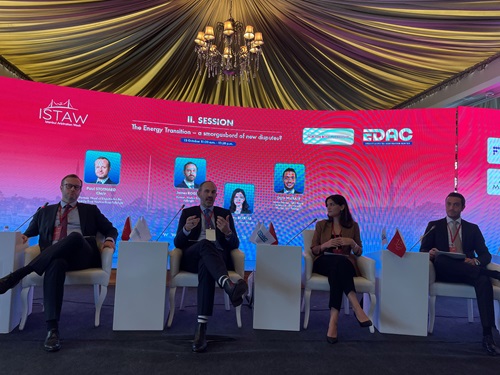
The Energy Transition – a smorgasbord of new disputes?
Norton Rose Fulbright was the gold sponsor of the Istanbul Arbitration Week 2022 which took place between October 10 – 14 in Istanbul, Türkiye.

In the Istanbul Arbitration Week, organized by the Energy Disputes Arbitration Center (EDAC), trending topics in commercial and investment arbitration were discussed with specific focus on investment projects in energy and infrastructure. The summit, which hosted outstanding keynote speakers and insightful panel discussions, attracted arbitration professionals from many different countries.
In the panel hosted by Norton Rose Fulbright, “The Energy Transition – a smorgasbord of new disputes?”, Paul Stothard and James Rogers of Norton Rose Fulbright, Ergin Mizrahi of Pekin Bayar Mizrahi in alliance with Norton Rose Fulbright in Turkey, and Dr. Esra Berktaş of GAMA Industry, discussed the financial, technical, operational and cultural challenges associated with the energy transition and how and where the expected disputes between stakeholders will be resolved.
As the moderator of the panel, Paul Stothard framed the issues and a definition of the energy transition. He mentioned that the term has been used for up to 30 years to mean political and market-driven change from fossil fuels to renewables and non- carbon-intensive forms of fuels to reach carbon net-zero and to mitigate climate change. He added that the interruption of gas supply caused by the war in Ukraine has caused an enormous price shock which in turn intensifies the pressure to move to alternative energy sources. With all these also being influenced by other interests, including that of states to secure energy supply and the interests of producers, consumers, and pressure groups, it is anticipated that these will lead to new and different disputes, both in arbitration and elsewhere, and that it may affect all aspects of the process. This will involve important issues for states, which may or may not tolerate treaty claims in relation to these issues, and if so how they are to be dealt with. The other key stakeholders will be energy providers (conventional and renewable), regulators (e.g. in relation to the achievement of net zero and dealing with incentives), business (e.g. construction) and in relation to enforcement.
Dr. Esra Berktaş, contributing from an in-house legal counsel perspective, described what energy transition means for states and for Turkey in particular in light of the Paris Agreement and governments’ net-zero targets and for the construction, infrastructure and contracting industries. She summarized Environment Social Governance (ESG) developments in Turkey and the new regulations such as the Capital Markets Board Regulation and the arising need in sustainability reporting for Turkish companies. Based on these developments, she framed the possible areas of disputes as; new government measures and legislations to reduce fossil fuels and their effects on existing and future investments, rising expectations of the technical standards in contracts for companies, and a possible rise in investor-state disputes, especially under the international and bilateral investment treaties. In conclusion, she underlined that the state and the domestic and foreign investors need to know the changes in regulations well and will have the need to decide which institutions to choose for the resolution of the possible disputes that we can expect to arise from these energy transition topics.
James Rogers emphasized the forthcoming increase in climate change disputes and underlined the need for new regulations in response to increasing risks. He stated the need for a shift from standard norms to development of novel industry standards and the importance of usage of new technology in all of this. James further discussed disputes regarding the application of ESG or Monitoring, Reporting & Verification principles by financial institutions as a result of breach of ESG criteria in financing agreements of energy transition related projects. He also spoke to the tension faced by the investment treaty regime as states compete for investment in new, green technologies while also recognizing a need to regulate in a quickly changing political and investment environment.
Ergin Mizrahi discussed the enforcement of foreign arbitral awards in Turkey the potential hurdles which can be faced during the process. First, he stressed that it is still not clear in Turkish law what type of court charges are applicable to enforcement claims. Secondarily, he discussed the risk which the Law no 805, dated 1926, can pose to enforcement claims with respect to the potential claim the arbitration is invalid if it has been drafted in a language other than Turkish. He further discussed the wide usage of public order defense, especially in infrastructure or energy disputes, with a particular emphasis on case-law concerning the State’s interest in the outcome of the dispute.



